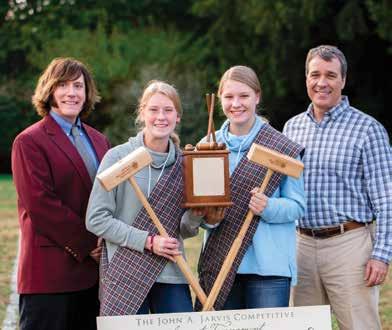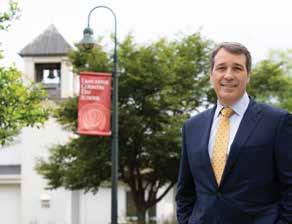
52 minute read
I Hope the Real Me Comes Out
by michael schwartz
LINDA CA
Advertisement

Linda Campbell keeps a box of love and light under her desk. It’s filled with the letters she’s gotten over the years from her former students and advisees who wanted FRom studENt to tEAChER No one person has her to know how happy they were in college or beyond and how grateful they are to have had her to point them in the right direction. In the fall of 1985, Campbell had recently become the newest member of the Country Day English faculty. One day she stood done more to shape and define the college counseling program of “When I’m having a bad day I pull them out,” Campbell said. “It doesn’t happen often, but when it does…” she trails off, then pithily summarizes her reverie: “I’m so chatting with fellow English teacher and Head of Upper School Donna Luttrell, who had a bit of half-gossip, half-performance report to share. Lancaster Country Day proud to have had a small part in so many “John Jarvis thinks you’re intense,” Luttrell School than Campbell. people’s lives,” she said. said. Campbell didn’t, and still doesn’t, quite No one person has done more to shape know how to respond. and define the college counseling program “Is that a good thing or a bad thing?” she wonof Lancaster Country Day School than dered aloud, more than three decades later. Campbell, who retired in June after 35 years of helping students discover their love Campbell’s teaching career began one day for everything from William Faulkner to William & Mary. after her undergraduate career ended. It was an inauspicious start. An English teacher, college counselor, and trusted confidante to generations of Country Day alumni, Campbell’s was an The diminutive Elizabethtown College graduate found herself at the head of Elizabethtown High School’s remedial English class. enduring — and assuring — presence in “I looked like I was 15 and they looked like the lives of many of those whose missives they were 25,” she said. “Who’s this Campbell fill her treasure chest, and many more who lady?” one of her oversized charges asked didn’t find the time to write, but remember with marked skepticism. “I am,” she her just as warmly. replied. Eventually, Campbell’s news was met with a slow, incredulous, “No.” She gamely Country Day is a college preparatory school, reassured him that she was indeed the new and Linda Campbell has devoted more of her teacher, an exercise she had to repeat several life to both sides of the preparing — teaching times before the reality of the situation and counseling — than anyone else. sunk in. AMPBELL
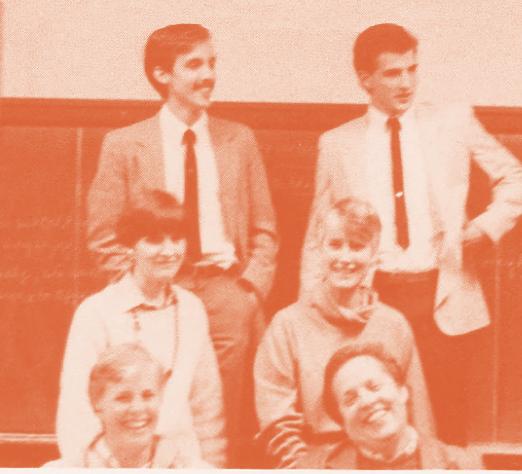


Things brightened after that, with Campbell going back to her alma mater to teach the freshman composition class at Elizabethtown College, and eventually landing — and juggling — four simultaneous teaching gigs: at Millersville University, Penn State Harrisburg, Elizabethtown, and Lancaster Country Day School.
“I was hired to teach freshman and senior English, and I thought I, let’s say, wouldn’t care for it,” said Campbell, whose brief teaching career had largely been to undergrad and graduate students. “But it was great!” she said. “Ninth graders are just like puppies. ‘Ooh! Ooh! What are we doing today?’ They were so much fun.”
oN CouNsELING & CoLLEGE A lover of literature, Campbell has a literary knack for speaking in fully formed paragraphs.
Asked what makes a good college counselor, she offered the following disquisition:
“My goal has always been to help kids find the place where they fit. I’m not a brandname person. I believe with my whole heart that it’s not where you go, it’s what you do once you’re there. So I celebrate everyone’s acceptance,” Campbell said.
“Every school has opportunities for students,” she continued. “I want to help students and their families find a college where they’re both challenged academically and satisfied more broadly. There’s more to college than just the academic part of it.”
When Campbell began as a college counselor, she was truly beginning from scratch. “No one talked to me about going to college when I was in high school,” she said. She became the fourth college counselor and took on a quarter of the senior class.
During the late ’90s and early 2000s, the college counseling program at Country Day received new resources and support, which provided Campbell with new freedom and opportunities.
“I had a very clear idea of what I wanted to do and where I wanted to take the program,” she said. To accommodate these new responsibilities and ambitions, Campbell began teaching fewer and fewer English classes, eventually trading the classroom for the counseling room completely, a move whose benefits came at a cost.
“The most important thing for a counselor is listening and getting to know the students,” Campbell said. “That’s one part of no longer teaching that I miss. I’ve spent enough of my life grading papers, but when I was teaching I knew students on a different level than I do now, and I miss that.”
When she first took the helm of a newly invigorated counseling program, she sought to make “Country Day” mean more than it had to the college representatives who visited.
“I wanted to be able to have facetime with the reps when they came to campus,” Campbell said. “Before, they would show up and the secretary would make an announcement and they would drop off their materials and that was it, and that was a wasted opportunity, I thought.” While the reps come to sell the college, it’s also important to “sell” Country Day.
“There are a lot of good students applying to colleges from a lot of good independent schools, so having those relationships and being able to put a name to a face can make ‘Lancaster Country Day School’ stand out when one of our students applies there.”
Every bit as important, and perhaps more demanding, than managing SATs and recommendation letters is managing kids’ and parents’ expectations.
Campbell’s approach is to temper encouragement with realism.
“I tell kids, look, I don’t have a crystal ball, but I can guarantee you one thing: If you don’t apply, you won’t get in, but let’s also look at some less competitive schools. I’ve never had a student who didn’t get into at least one school,” she said.
Campbell stresses that for as much as the admission process can be a logic- and reason-defying black box, students can do a great deal to take the reins of their own destinies.
“You have to realize that there are a lot of other applicants with very good grades and very good SAT scores and just having those isn’t enough to distinguish you when you’re applying to a very competitive school,” she said. Kids have to make themselves stand out to admissions officers who are looking at hundreds or thousands of smart, qualified applicants. Or, as Campbell put it, “I don’t want you to be another plain cookie. I want you to be the cookie with the sprinkles on top.”
tuItIoN
The steady, stratospheric trend of college tuition worries Campbell, but, “That doesn’t make a difference in my counseling,” she said. “I make a shopping list based on the student’s interests, school size and geographic preference.” Although, as a nod toward thrift and a desire to see students graduate saddled with as little debt as possible, “I always put Penn State, Pitt, and Temple on that list,” Campbell said.
“I was raised by people who went through the Depression,” she continued. “Life is hard enough without graduating and finding you’re 22 and have $100,000 in school loans. Being in debt is not good.
“But this question of tuition is something I’ve been thinking about a lot, especially in the last five years or so,” Campbell continued. “Colleges are putting so much money into things that have little or nothing to do with education. At one point after visiting a few schools, I remember thinking that if I see another climbing wall I’m going to scream. This spending isn’t sustainable, and it leads to kids and parents being seduced by all this other stuff. The process of choosing a college and choosing a country club shouldn’t be the same,” she said. And on the question of Harvard vs. Haverford vs. Bucknell vs. Millersville, that is: How much does it matter where you go to college, Campbell didn’t hesitate. “I don’t think it matters at all where you go to undergrad,” she said. “What you do is more important than where you go. If you’re an ambitious student, you’ll discover there are professors and students who will challenge you wherever you go.” Campbell, not surprisingly, believes there’s great value in a liberal arts education, albeit not from the standpoint of immediate utility. “I had to take history and appreciation of art and I certainly never intended to be an art historian or museum curator, but the knowledge I acquired in that class stays with me and I draw on it every time I go to a museum. I’m able to appreciate it on a deeper level than I otherwise would,” Campbell said. “You don’t always see the value of it at the beginning, but it gives you a broader perspective. There’s something to be said for developing the life of the mind. And, especially today, there’s something to be said for developing an educated citizenry. Learn. Become informed.” Campbell waxed nostalgic about teaching, when she was the one guiding students’ learning and becoming informed. “I love learning to know kids on a one-toone basis,” she said. “I hope the real me comes out in those situations. I really care about my students. I want them to do well. I like talking to them.” We like it too, Mrs. Campbell. And we thank you.

VIEWS from a PANDEMIC
BY MICHAEL SCHWARTZ
In retrospect, it seems fitting that the 13th of March 2020 fell on a Friday. For Country Day students, faculty, and staff, it was the final weekday of spring break. At 2:14 p.m., Head of School Steve Lisk sent an email announcing the cancellation of all on-campus activities for the next two weeks. Two weeks became two months, and life at LCDS, like life everywhere else since the arrival of the coronavirus, changed in fundamental ways. In the 11 months since “Covid” joined the English language, it has killed a third of a million Americans. Millions more have been sick or lost time with loved ones or their jobs, while the fortunate among us have merely traded life as we knew it for the safety of what sometimes feels like the Overlook Hotel. We present here the stories of five alumni directly affected by the pandemic. Their experiences and perspectives are unique, but they share two essential elements: They’re all Country Day grads, and they all discovered and followed their own path through the Twilight Zone that was 2020. Our story has five characters: The Doctor, The Parish Priest, The Teacher, The Clinical Trial Designer, and The Patient and New Mother. We begin in the nightmarish early days, when knowledge of the virus was scant and effective treatments unknown. From the last week of March to the first week of April, the number of new coronavirus cases rocketed from 10,433 each day to 26,930, an increase of 158 percent. In early April, not long after “Covid” stopped setting off spell check, Connections spoke with Dr. Robert Groff ’98 in Atlanta, where he works as a critical care anesthesiologist at Emory University hospital and teaches at the Emory School of Medicine.
The doCtoR “We’re learning on the fly,” Groff said, “which in an academic sense is sort of exciting, but in a practical sense is absolutely terrifying.”

Groff earned an M.D. from the University of Pittsburgh and then headed to Stanford, where he did his anesthesiology residency as well as completing a fellowship in critical care medicine. In that decade of rigorous medical training, was there ever a class or perhaps just a small unit on navigating a pandemic? “‘No,’ is the short answer,” Groff said. “The closest thing to that was in the last year of medical school when we had an exercise in emergency medicine where we ran through disaster scenarios where resources didn’t meet needs, for example, and as far as that goes, it wasn’t nearly enough to amount to preparation.” The intensity of confronting a novel health crisis on the fly has taught Groff something else that didn’t come up in school: How an individual behaves under normal circumstances is a very poor predictor of how that person will behave when those normal circumstances fall apart, taking all of our unconscious expectations and assumptions with them. “One of the more important things I’ve learned is the effect of uncertainty on behavior,” he said. “Understanding how to practice against an invisible enemy that is potentially dangerous to staff and families makes people act in ways that are very different than how they usually do.

“It’s been fascinating to watch people’s behavior,” Groff continued. “We’re all experiencing high emotions and high anxiety, and therefore we’re much more prone to having challenging interactions with each other. I spend a lot of time on the phone trying to defuse interpersonal tensions, which has come as some surprise.” Surprise because the tensions have flared up among professionals, or because he’s the one being called on to play the role of marriage counselor?
“Because I’m the one playing marriage counselor,” Groff replied instantly. “Sometimes I feel like my job is less being a doctor and more being a coach. That’s been an adjustment, let’s say.
“I’ve heard people say that the pan in pandemic is for panic. Maybe that’s a part we didn’t appreciate going into this,” he said.
Groff said that when he saw the speed with which the virus spread and overwhelmed the health care system in Italy, he “became very concerned.” Not long after that, Covid-19 showed up in Seattle. “When I heard from my colleagues practicing there, that crisis was even more terrifying than what I’d read and seen about Italy,” Groff said. “A big challenge is that most physicians practicing now — of my generation — have never experienced anything like this,” he continued. “There are some older doctors who had experiences treating SARS and MERS, and others who dealt with Ebola, but there aren’t many and this isn’t the same.” Groff then spelled out a prediction that time and tragic experience have proved all too prescient. “I’m not a virologist and I’m not an infectious disease specialist, but I think the only way we’re going to fully come out of the other side of this is when we’ve got a vaccine or developed herd immunity,” he said. “In the absence of that, reducing social distancing or backing off on the measures that we’ve taken to get this under control will mean that people are going to keep getting sick. “The way this was handled from the federal level has been just bonkers,” Groff continued. “Totally bungled.” Since Groff made that diagnosis, the number of Americans dead from Covid-19 has risen from 26,000 to more than 350,000, and while several vaccines have been developed in record time, the pandemic rages on. Groff’s thoughts then turned from immediate medical matters to broader, deeper, and longer-term concerns. “This is going to change society and us as individuals,” he said. “It’s not as if this is like a bad night on the town and we just have to sleep it off and things will go back to normal,” he continued. “This is going to fundamentally change business as usual. As a physician, as a human being, we’re going to have to figure out how to do the things we do that make up our daily lives in a way that makes peace with the new normal.” The pAtIENt & NEw mothER When Carrie Pyfer ’97 spoke to Connections in mid-November, it had been roughly 17 days since she had been exposed to the coronavirus, about 15 since testing positive for Covid-19, and a just under a week since she felt almost back to normal.
So what did that experience teach her about the pandemic that she didn’t appreciate before she got sick? “It amazes me that people are good about masks in public, but socially they’re not,” she said. For example?
“So, when you’re out and about in the grocery store or walking around downtown, generally you see people wearing masks and being responsible, but the minute you get into a small yoga or Pilates class, or you’re around people you’re familiar and comfortable with, the masks come off. “You might still be socially distant and everything else, but there’s this sense of, ‘Oh, I know you. We can take our masks off,’” Pyfer said. “That’s how I got it,” she said. “From my mom.” “She was in a really small yoga class in a large space. They’re all about 15 feet apart, socially distant, and they’ve taken off their masks. “She was one of three women plus the instructor. Two of the three women got it from the instructor,” Pyfer said. “And that’s what gets me, just how crazy infectious this is and how easily it spreads through the air. I mean, I’m a teacher and I’m used to getting sick from touching stuff that sick kids have touched or coughed on or God knows what. And before my mom got sick and I got sick, I would have thought they were behaving responsibly. Yeah, they had taken off their masks and it was enclosed, but you think, you know, it’s a big space and high ceilings. “Nope. Doesn’t matter,” she said.
Pyfer became so fanatical about keeping her sixmonth-old daughter, Veda, from getting infected that she slept with a mask on for days out of an abundance of caution.
Her mom found out she had been exposed around Halloween, and it was around that time she transmitted the virus to her daughter. Both of them had very mild symptoms at first.
“I had a little cough, and then about two or three days later, it was a bit more of a cough, but I had just cleaned out the backyard and I always get a little congested and seasonally stuffy. And that’s all it was for the first week,” Pyfer said. At first, it didn’t even occur to me that it was possible” that her symptoms were the first manifestations of Covid-19. “We’d been so careful. For months we’d only gone to yoga and each other’s house.”
Two days after her first symptoms, Pyfer got tested. Three days after that, she started “not feeling so great.” “It’s crazy how the symptoms of this vary as much as they do,” she said. “I got really sick to my stomach and couldn’t hold anything down for three-and-a-half days. It felt like the flu, except it would ebb and flow, so I’d think, ‘Oh, I’m turning the corner here,’ and then two hours later I’m back on my knees.” “That up and down was disorienting. It’s like your mind’s not sure why it’s struggling,” she said. Adding to Pyfer’s nauseating ride was the need to keep her baby well — all on her own. “I have this new baby and I’m struggling because I don’t want people to be near me or in my house because I don’t want to get anyone else sick.” For about 10 days, Pyfer felt a deep and persistent exhaustion. “I was really run down. I wasn’t eating. It took all my energy to change a diaper or go get sick.” Finally — thankfully — Pyfer began to improve. And throughout, her baby girl, Veda Louise, handled the entire situation like a pandemic professional. “I suppose I’m biased, but all the data shows that she’s perfect,” declared the proud mother. Her thoughts then turned more somber. “I wanted to go on a Veda tour and travel all around the country to visit friends so they could meet her,” Pyfer said. “Well, so much for that plan.


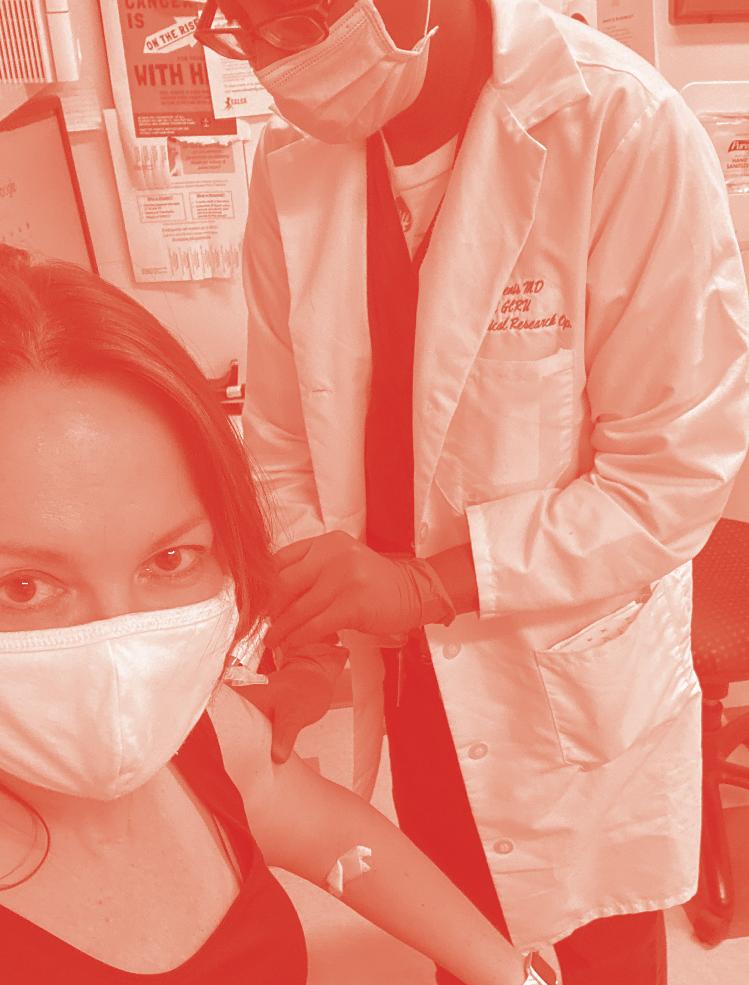
The CLINICAL tRIAL dEsIGNER Kelly Johnston McKee ’95 has discovered something: It’s infinitely more appealing to think of yourself as Chuck Yeager than a lab animal.
“People say no, no, no, I don’t want to be a guinea pig. And that’s the wrong way to think of it. I want people to think of themselves as test pilots,” she said. “I want them to understand that they are on the edge of innovation and are playing a vital role.” McKee is senior director of patient recruitment and registries for Medidata, a firm that makes software for clinical trials, and she talks about her job with an evangelical enthusiasm. “Working in clinical research is really cool. This is how new medicines and vaccines get developed,” McKee said. “Every time you take a pill for your headache or your dad takes medicine for his blood pressure, the reason those medicines are available is because other people raised their hands and participated in the clinical trials that made sure the drugs were safe and effective.”
While there’s no shortage of drugs on the market, McKee finds a lot wanting in the conventional approach to creating clinical trials.
“We as an industry don’t do enough, and haven’t done enough, to promote trial participation,” she said. “I think it’s because in the past the industry was focused more on the data to obtain approvals. It’s only more recently that we’ve been paying more attention to individuals in the value they bring to making new drugs possible.”
One small part of making trials more appealing consists of word choice, McKee said. “I’m against calling clinical trial participants ‘subjects.’ Maybe this is where my anthropology background comes in, but it’s important that people be able to think of themselves as individuals.” After all, even if you wear number 99, it’s decidedly more human for folks to call you Wayne Gretsky. McKee has designed clinical trials for more than a decade and explained them this way: “A clinical trial is really a way to answer a question,” she said. “Is a given drug more safe and more effective than the standard therapy? There’s a carefully designed experiment and volunteers are recruited whose participation answers that question.”
For the first time, the trial designer is experiencing a trial firsthand; she volunteered for a Covid-19 vaccine study.
“It’s been really interesting,” McKee said. “It’s given me the opportunity to look from the perspective as a patient while also having the perspective of an industry insider. I’ve seen a few instances where things weren’t as pretty as I would have liked to see them, and that was a consequence of the trials being rushed. Now that I’ve been on the inside, I have more street cred, if you will, because I can say that this is what will happen if we do or don’t do X or Y.
“One example is that when I received my patient symptom card, some of the instructions had been crossed out by hand,” she continued. “Now, I can understand how that probably happened and it’s not the biggest thing in the world, but it really doesn’t look great.
We need to be more thoughtful. I want every patient in the trial to have a great experience so they talk about it with their friends and then those people decide that they’d participate too.”
“We are all so desperate for this pandemic to end, and the only way to get through this is for us to raise our hands.”
The pARIsh pRIEst On Shayna Watson’s 12th Easter Sunday, she was looking forward to going to the store to get her Easter dress when she heard her sister scream in the other room. Their father had died earlier that morning, and, because her mom was away visiting Watson’s grandmother, no one knew he was dead until it was time to leave for the store.
Watson grew up in a very morally conservative and strict church that excommunicated LGBTQ members. That also rankled, and she found herself still more fired up in her “boxing with God.”
“These [excommunicated] people are lovely; my dad died; I’m hearing about this vengeful God and I just thought, ‘What the hell?’ Then I began seeking a better God than the one I grew up with,” Watson said. Did she ever find him? “Yeah,” she said with a bright laugh. “Just a couple years ago!” Watson spoke to Connections in early August, two months after becoming the associate rector at St. James Episcopal Church in Lancaster. Some years are indeed tougher than others, and while turning to the church for succor and solace is hardly unusual, Watson has seen some of the faithful and shaken expect too much. “People have this idea that church is this big thing that’s exempt or excluded from world events. So here there’s no racism, no disease. This is a place where you come and worship and you’re not hindered by social, or political, or health concerns. It’s flattering and romantic and we should be removed from or beyond worldly things,” Watson said. “But the church is brick and mortar and our bodies are flesh and blood, and we shouldn’t forget that we are in and of the world.”
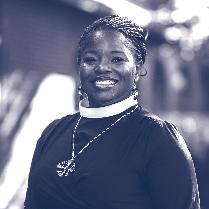
She continued: “Ministry is different now. Families can’t be together to bury a loved one who’s died. That’s just one example, but more generally [the pandemic] has affected our rituals and how we console one another.
“These aren’t small things.”
The tEAChER Returning to the classroom was a frightening proposition for many teachers. Betsy Hedbavny ’90 teaches kindergarten at Country Day and when asked how she felt about returning to the classroom, she didn’t equivocate.
“I could not wait,” she said. “It’s 1,000 times easier to be back in the classroom. In Lower School — maybe not just Lower School but especially Lower School — kids need to be in class. That instant feedback is essential. They need to be with us, and we need to be with them. “It’s hard for parents to juggle work and [virtual] school,” she continued.

“I’m not trying to do their job and they shouldn’t have to try to do mine.” Still, when Country Day went all virtual, Hedbavny was glad it happened in the spring and not sooner. “One thing that’s more true in kindergarten than in other grades is that the kids you start the year with are not the ones you end the year with,” she said. “In September, I’ve got a class full of junior kindergarteners and by May I’ve got a class of first graders. When Covid hit in March, they were good, solid kindergarteners and handled the transition to the virtual thing pretty well.” Thanks to the wonderful flexibility of young children, Hedbavny said that teaching in the Covid classroom has gone pretty smoothly.
“Kindergarten is totally where it’s at,” she said. “The social distancing is hard for them, but the mask-wearing isn’t at all. In Lower School, we’re used to being patient, compassionate, and kind. One day, a boy walked into class with his mask covering his nose and mouth — and his eyes. It’s OK. They’re 5.”
“It’s a lot more difficult for Middle School and Upper School students,” Hedbavny continued. “They thrive on social interaction. For that age kid, who’s important to them? Their friends. Kindergarteners want to be with mom and dad. And if you want them to wear a mask? They’re just like, ‘OK.’ They don’t have as many opinions, whether backed by science or not.”
For as bright as Hedbavny’s school experience has been, it started out about that dim for her oldest son, Jacob ’20. “It’s a nightmare to be a freshman in these circumstances,” said Hedbavny, whose son is attending High Point University. “You leave your home, your family, and your friends, and then you get to school and you’re told you can’t connect with other people. All they want to do is meet somebody.” Still, Hedbavny remains sanguine, and offered these parting words on navigating the pandemic. “Kindness and compassion are a must,” she said. “Everyone’s trying to do their best. No one’s trying to be a jerk. “Well, very few people.”
THE UNFOLDING SUCCESS STORY OF CRISTIAN TINEO
The First Hubbard Scholar Reflects On His Journey

By Michael Schwartz
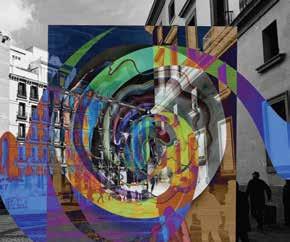
When Cristian Tineo ’18 sat down to speak with Connections in January 2020, he was halfway through his second year at Dickinson and had managed to whittle his choice of major down to one. That is, he knew for certain that he would major in something. Or maybe a couple things. But then again… “College wasn’t really what I expected,” he began, smiling his shy smile. “With the academic stuff, I felt prepared, but college is a new environment that feels familiar to Country Day, but different as well.” A lot of the difference, he said, boiled down to time management. “School is your life,” he said. “Realizing that was a change.” “It took me a little while to find a new support network, and I had such an incredible one here. But it’s going really well now,” said the then-sophomore. “I’ve got great friends and professors who support me academically and emotionally.” “I was going to double-major in studio art and, well, first it was Latin American studies, and then I was thinking anthropology, but it’s so much work so now I’m thinking that I should just try to graduate rather than do too much,” Tineo said. Country Day’s first Hubbard Scholar graduate is well on track to do that, and when he does, it will be with a degree in studio art. Probably. “I like how open it is,” Tineo said. “I’m doing some photography, drawing, and art history.” In early 2019, Tineo was contacted by Dickinson’s financial aid department. Or maybe it was the foreign language department? “I got an email from someone,” he said, “and they thought I should apply for a Gilman Scholarship.” Whoever sent the email was right: Tineo applied and was accepted. Dickinson has a new satellite program in Brazil, and Tineo became a member of its inaugural class. The Gilman Scholarship is a State Department program aimed at helping students of limited financial means study abroad to further their education, and benefit America by bringing back valuable skills including speaking a “critical need” language such as Portuguese.
Part of becoming a Gilman Scholar involved completing a service project. Tineo chose to do his at Country Day with the Horizons Program.
“The idea is to spread the word about Gilman, to fill people in about what it is and what it’s all about,” Tineo said. The way he’s chosen is the same way his mom chose to fill in the family’s collective memory: With photos taken on a disposable camera.
In the fall of 2019, Tineo took a trip to Philadelphia and added a new piece of gear to his usual kit: A disposable camera. The limitations imposed by having a finite number of frames on a roll of film and a fixed focal length in which to frame shots forced Tineo to think about shooting differently, and that process, and its tangible results, were inspiring.
“I like having something to hold, something physical you can hand to someone and share with them,” Tineo said. “I want to show the kids how they can use cameras to document their own lives and tell their own stories and give them a way to show others what their lives are like. “They might all have some common background or experience, but they’ve still got individual stories. So I thought I’d give the kids each their own disposable camera and at the end of the summer, collect the photos for an exhibition.” Why disposable cameras? “My mom has a big box of old photos, all taken with disposable cameras. It’s nice to have something to hold,” Tineo said. “Today everything is so digital, and that’s great in a lot of ways, but for me, photos are something that’s on an SD card and then my phone, and that’s where they stay.” As a freshman, Tineo took a photography class where they learned to shoot with and develop film.
Tineo realized a few other things freshman year: He loved Portuguese, and he wanted to be a teacher.
He smiled and laughed as he launched into the backstory and explanation. “There are times when I walk into class and I’m not at my best. With Portuguese, it was different,” he said, explaining how the teacher had such a gift for making each session interesting and engaging. “I remember thinking, ‘This class is valuable.’” Not long after that, Tineo found he had turned a worksheet over and, without consciously meaning to, written a certain Portuguese sentence. In English, it translates as “I want to be a teacher.” “That professor is a great resource and source of support,” he said. “It made me think about applying for a Fulbright Scholarship, which I also mentioned in an application essay.” Tineo’s plans were put on hold because of the coronavirus pandemic, but when he heads to Brazil, he will spend the entire year studying in São Paulo. Each semester will consist of four classes, along with an independent study with the program director. Asked what he hoped to get out of the program, Tineo paused. “I hope to get as much out of it as I can, and put into it as much as I can. I want to grow as a person in ways I can’t picture now. I still have doubts. I’m still anxious. There are still times when I think I’m not ready for this.” “I said this to Raul,” an associate professor from Brazil visiting on a Fulbright Scholarship, “and he told me I’m going to come back having been through so many experiences that I will be a different person — in a good way. And studying the Portuguese language and Brazilian culture has opened up a whole new world to me, so I think I’m in a good place.”
A HUBBARD SCHOLARSHIP PRIMER


The John Cooper Hubbard ’59 Scholarship Endowment is named after a generous benefactor whose bequest ensures a position at Lancaster Country Day School for an enthusiastic and well-qualified fifth or sixth grade student whose family could not otherwise afford LCDS. This fund was established to make a Lancaster Country Day education available to students of diverse backgrounds and to demonstrate that our school is open to anyone who meets our academic standards.
112 TH CO mm ENCE m ENT | CLASS O f 2020 2020 evie lynn altland matthew adams armitage elise caroline atkinson waasae ayyaz bryner barnhardt ethan graham becker ashley h. blum-woodland renie lee christensen malia jade cintron annabelle rose copeland peyton clark davis ashanti divine duncan yuqing fan hayden todd feddock whitney stewart finney kate lyn fry christian engle fulton olivia anne gallucci abigail downey gardner grace wakefield gardner magdalene anah gelgot wesley jakob gilbert denis aubrey harkin jacob sailer hedbavny jonathan frederick helm amera yvonne hemming jake bradley horvat abdul-kareem beyan el hosini mira bien hurtt janani iyer justin mark kresse gabriel vincent leskusky zachary noah liss gilbert pierce lyons adam ibrahim majid hasan maqbool christopher james matthews gregory james mizii jr julia kathleen mocny haley morphy teresa concepción murphy julia rae nahm gabriela lise nahm ryan chau nguyen dylan james parsons alexander j. polito jonah david rebert maya amishi robinson nina isabella shih anna park sotirescu kaela nikol stankiewicz saharsh talwar morgan rose tate shaan singh toor gabriel charles walton lauren ann wassell owen chairsell woodard vannetia liwen xu theo hanyuan zhang keting katie zhang

AdEL phI uNIVERsItY CoLLEGE oF woostER CoNCoRdIA uNIVERsItY dAVIdsoN CoLLEGE dELAwARE VALLEY uNIVERIstY dEpAuL uNIVERsItY d ICKIN so N Co LLEGE ELI z ABE thtow N Co LLEGE E mo RY u NIVER s I t Y F o R dh A m u NIVER s I t Y FRANKLIN & m AR sh ALL C o LLEGE GE o RGIA IN st I tut E o F t EC h N o L o GY G ou C h ER C o LLEGE h AVERF o R d C o LLEGE h IG h po IN t u NIVER s I t Y LAFAYE tt E C o LLEGE moNmouth uNIVERsItY mouNt hoLYoKE CoLLEGE NEw YoRK uNIVERsItY NoRthEAstERN uNIVERsItY ohIo wEsLEYAN uNIVERsItY pENN stAtE uNIVERsItY poINt pARK uNIVERsItY pRINCEtoN uNIVERsItY quEENs uNIVERsItY oF ChARLottE Ro BERt mo RRI s u NIVER s I t Y Ro C h E st ER IN st I tut E o F t EC h N o Lo GY st . L ou I s u NIVER s I t Y s YRAC us E u NIVER s I t Y tu F ts u NIVER s I t Y uNIVERsItY oF dELAwARE uNIVERsItY oF mIChIGAN uNIVERsItY oF pIttsBuRGh u NIVER s I t Y o F s CRAN to N u NIVER s I t Y o F south ERN CALIF o RNIA uNIVERsItY oF tExAs AustIN uNIVERsItY oF utAh uNIVERsItY oF wIsCoNsIN mAdIsoN uRsINus CoLLEGE VILLANoVA uNIVERsItY wAKE FoREst uNIVERsItY wAshINGtoN uNIVERsItY IN st. LouIs wEst ChEstER uNIVERsItY wILFREd LAuRIER uNIVERsItY
hAYdEN FEddoCK
ChRIstophER mAtthEws GABRIELLA NAhm
AshANtI duNCAN
ANNA sotIREsCu
mEEt thE CLAss oF 2020 AwARd RECIpIENts
the trustee prize
NINA shIh
Awarded to the senior with the highest grade point average.
ruth s. hostetter award
ANNA sotIREsCu
This award honors the memory of a Shippen School graduate from the Class of 1931 and recognizes a senior who, over an extended period of time, has worked selflessly and enthusiastically to enhance the school community.
ann musselman award
ChRIstophER mAtthEws
Given in honor of Ann Musselman, who was an LCDS teacher for 30 years, this prize is awarded to the student who has enthusiastic curiosity, takes intellectual risks, loves to learn, and lives life to the fullest. faculty award
GABRIELLA NAhm
Given to the student who embodies what the faculty most respects in a scholar and a person, an individual who has a true love of learning and is a model citizen.
head of school award
AshANtI duNCAN hAYdEN FEddoCK
Presented annually by the Head of School, this award recognizes the seniors most deserving of special praise for exhibiting qualities such as leadership, school spirit, persistence, and civic virtue.
&Q
A
by michael schwartz

JACK WEGE ’14
Wege graduated from Carleton College in 2019, where he earned a degree in political science. He hit the ground running on the practical side, working for candidates from the local to national level before landing a job in security consulting in Washington, D.C. The arrival of Covid put that on hold for the moment, freeing Wege to return to his alma mater as a Middle School proctor.
ERIKA FAULKNER ’16
Faulkner graduated from Dickinson College in May and returned to Country Day as Paul Bostock’s long-term proctor. While earning degrees in both political science and environmental studies, Erika also organized an annual lecture series at Dickinson and interned at the U.S. Army War College, where she explored women’s experiences in war.
SARAH SPIRE ’16
Spire graduated from Denison University in May after earning her degree in education. She attended LCDS from kindergarteneighth grade and has wanted to be a teacher for as long as she can remember. This fall, she took her first steps toward that professional dream alongside her sister, Caroline ’21.
Country Day’s youngest teachers have a unique perspective on their students. Not long ago, that’s exactly what they were.
How’s this new gig of yours going?
JW | For the most part, it’s going as well as can be expected. Working with Middle School students for the first time has been an adjustment, but remembering back to what my friends and I were like at their age has helped.
EF | Well! I’ve always been interested in teaching, so getting in a classroom for a semester has been really helpful while I try to figure out the next steps for my career. Plus, I get to work with Mr. Bostock, which is fun, always.
What do you know about teaching today that you didn’t when school started?
JW | I never realized how difficult it can be to teach the same lesson many times in a row. Each section needs to cover the same material, so it’s teaching the same thing for two days straight then trying to remember where exactly each section left off.
EF | Watching a socially distanced Color Wars is strange.
SS | It is all about flexibility and patience. There are more than a handful of things that can go wrong throughout the day, and you just have to take some deep breaths and adapt.
Just how weird is it to be in the classroom during this pandemic?
JW | It’s much more of an emotional rollercoaster than I expected. My assumption was that it would be a high but constant level of stress to be around kids and watching over them in this environment. Instead, it’s long lulls without too much worrying followed by brief moments of panic when a student — often unintentionally — breaks protocol.
SS | I would say it’s more sad than weird. The best part of school was always getting to interact with your peers both in and out of the classroom, but it’s hard to do that these days. I had a student tell me that they never enjoyed group projects but they’d give anything to be able to go to the library and sit around a table and work with their classmates.
How well are the kids adapting to the strangeness of the current moment?
JW | It’s a common mistake to underestimate the adaptability of children; I definitely made that mistake here. They’ve adapted remarkably well, with logistical or technical issues being worked through often within minutes. Things are certainly different, but in many ways, shockingly little has changed about day-to-day classes.
EF | I think the students are adapting as well as can be expected. A lot of things I took for granted in high school (afterschool activities, going on coffee runs as a senior, even just sharing a phone charger) cannot happen now unfortunately. But the students are doing a good job at taking it all in stride.
SS | They’ve adjusted incredibly well, in my opinion. While it is by no means an ideal situation, they’ve held their heads high and done what they need to do to make the best of it.
What about this experience has turned out differently than you expected?
JW | I expected to be a proxy for the teacher in the room, doing fairly usual teaching tasks that they couldn’t due to being remote. For the most part, it hasn’t worked out that way. I do help answer questions and clear up confusion, but otherwise my job consists much more of solving technical issues, keeping kids on task, and dealing with problems that come up in the room.
EF | I honestly assumed more kids would struggle to properly wear their masks, but the vast majority of students have been really responsible and respectful about following protocol.
What’s the most fun part about being in the classroom with kids?
EF | This is a very nerdy response, but as a former political science major, I really enjoyed talking with students about the presidential election. And seeing how they talked about it among themselves was really interesting too.
How did your friends and family feel about your decision to teach?
JW | Thankfully the people in my life have been overwhelmingly supportive. There are the usual worries about keeping healthy, but most of my friends my age see it simply as a great opportunity to be employed and pay my bills, while the adults in my life have always placed a great value on education and think that the work of making sure everyone has the best education they can is important.
SS | They — and I — felt great about it. I’ve loved school my whole life and having the opportunity to ignite that passion in my students is what drives me to do what I do.
CLASS NOTES
We recognize that social media is an easier way than Class Notes for our alumni to stay in touch. Please see P. 2 for a listing of LCDS social media accounts. You’ll notice alumni news and updates moving more onto these networks, even as Class Notes continues to be a place to see some alumni submissions, reunion updates and event pictures. To submit a class note for print or Web publication, contact the Alumni Office at dandridgea@lancastercountryday.org.

1950s
1951
Margaret Haller Hannum 717-299-3798 phannum2@comcast.net
Peggy Hannum was inducted into the Rug Hooking Hall of Fame in 2018. Her work has been recognized for outstanding contributions to the art of rug hooking. Examples can be seen at www.peggyhannum.com.
1954
Sally Rich Rohrer 717-394-0847
1955
Eunice Fulton Blocker 502-895-2691
1957
Elizabeth (Beppy) Foltz Martin
Beppy writes, “My mother, Katharine Carey Flinn Foltz, graduated from The Shippen School in 1917, and I graduated from LCDS in 1957, as you know. My father was honored to be a Trustee, and we all loved the school. I chose to become a public school teacher of history and English after attending Yale, thanks to Clifford Gordon and Dr. Joel Haynes, two gifted teachers Country Day was smart enough to find.”
1958
Barbara Jaeger Gillis 717-299-3374 wicklawn1770@comcast.net
1960s
1960
Anne Campbell Slater 610-896-6468 Slater.Anne@gmail.com
The Class of 1960 participated in a Zoom Reunion (their 60th) on Oct. 5, 2020. They enjoyed more than two hours of catching up and discussing families, jobs, and the vicissitudes, sad and/or growth-inducing, of life.
The class of ’59 met for their 60th reunion in October 2019 in Lancaster. This class has gathered to celebrate every year’s reunion since graduating!
1961
Alix Shuman Roth 717-507-8227 alixsroth@verizon.net 1962 Anne Darmstetter 1964 Phyllis Morgan-Rupert 717-768-3322 30%REPRESENTED NEARLY 2/3 FROM 2019 DONORS ALUMNI
1966 #WEARECOUGARSTRONG @LCDSALUMNI
Joseph A. Myers Jr. 717-394-9854 joemyers1@comcast.net The Class of ’75 celebrated their 45th 1968 reunion via Zoom. It was Deborah Murray Martin great, as always, to catch 717-290-2082 up with everyone! debbie.martin@fandm.edu

1970s
1971
Melissa Byers 818-719-6550 melissabyers@earthlink.net
1974
Mannie Tobie is a graphic designer in Washington, D.C. She and her husband, George Collins, have two boys, Read and Tobie.
1975
Diane Eshleman Djordjevic 410-919-7219 dianedjordjevic@gmail.com
1976
Margaret Hall Norton 503-638-6127 Margie.Norton@cenveo.com
1977
Eileen Eckenrode Vroom 540-338-3630
1979
Sarah Miller Dorgan 717-687-6466
1983
John F. Hinkle III 717-898-5728 jfh3rph@comcast.net
1984
Kathleen Murphy Jasaitis 781-631-7899 kmjasaitis@comcast.net
1985
Deborah Dodds 310-415-7796 Debby@DebbyDodds.com
1986
Joanna Underhill 717-468-3788 jomortonsalt@gmail.com
1987
Kristen K. Gedeon 703-283-6187 kristengedeon@hotmail.com
Bill Korner Class is celebrating his 25th year in the insurance industry.
1988
Jack Fulton 717-394-2255 jack.fulton@tecomet.com
1989
Bob Porter pistol3667@aol.com
1990
Mary Fulton Gingrich 717-560-4908 maryfgingrich@comcast.net

1991
Susan Hull Dworsak 717-464-3537 sdworsak@gmail.com
{CLASS NOTES } 98
1992
Kate Matwiczyk Hemmerich kmatwiczyk@gmail.com
1993
Jennifer Gschwend McGough 610-430-7671 drgschwend@yahoo.com

1994
Stacey Gregg 919-622-4284 sgregg13@yahoo.com
1995
Betsy Wademan Ahlstrand 415-845-7654 betsyahlstrand@gmail.com
Jennifer Mikes 781-558-5293 jcmikes@gmail.com
1996 Dennis M. Baldwin 484-269-4309 fcsp3@yahoo.com Kerry Diamond Rinato krinato@gmail.com ’
1997
Mark Ewing 303-859-4994 photos@foresightphoto.com
Elizabeth Weaver ’98 is the entrepreneurial owner of Lancaster Farmacy, a small, certified-organic farm that specializes in growing herbs for medicinal teas. In fall of 2019, she made beautiful holiday wreaths out of her greenery and ornamental plants.
97
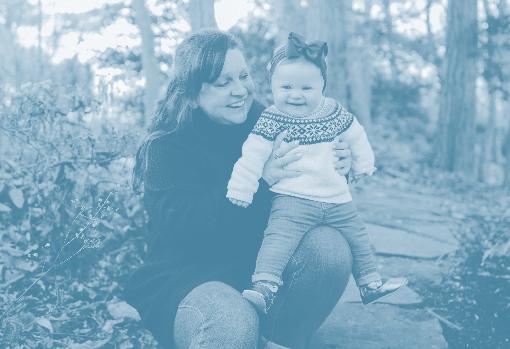
’’86 86
1998
Alexandra Goodman agoodman@fraser-ais.com
1999
Meagan W. Dodge 415-846-8715 meagan_dodge@yahoo.com
Victoria Coates ’86 has been named the next president of the Middle East Broadcasting Networks. MBN is part of the United States Agency for Global Media, whose other broadcasts include Radio Free Europe and Voice of America.
Carrie Pyfer ’97 welcomed daughter Veda Louise to the world in May 2020. While having a baby in the middle of a pandemic was not what had been planned, everyone is doing well and was so happy to have something to celebrate this year.
READ MORE ABOUT CARRIE ON P. 24
VIEWS from a PANDEMIC
PEOPLE
New York, N.Y.
Jan. 9, 2019 Alumni gathered for a regional reception at Hudson Yards in New York City.


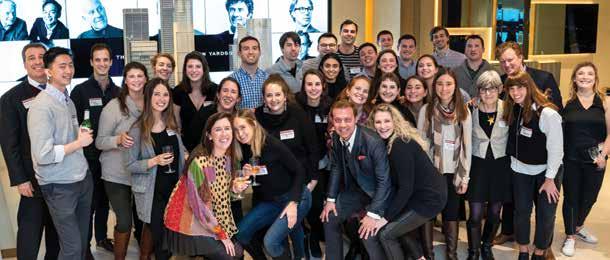


Senior Alumni Association Luncheon
Oct. 10, 2019



V I R T U A
Cougar Daiquiri

ANDREW W. KILLOUGH ’08 Cougar Cocktail/Mocktail Contest Winner
1 lg. blackberry (muddled) 2 raspberries (muddled) 2 oz. white rum 1 oz. lime juice 1 1/2 tbsp. simple syrup Add ice, shake, then double-strain into chilled coupe glass and garnish with two cougar ear lime peels.
Country Day’s First Virtual Alumni Weekend
Oct. 9, 2020 Virtual Alumni Weekend kicked off with the all-alumni cocktail party, sponsored by Yianni Barakos ’04, owner of Mason Dixon Distillery, and featured Family Feud with Paul Bostock! On Saturday, alumni enjoyed yoga with Christine Healy, science demonstrations with Todd Trout, crafting with Diane Wilikofsky, and got a look inside our theater program with Kristin Wolanin. …
Missed a virtual session?
Contact dandridgea@lancastercountryday.org to view them on demand!
L

2000s
2000
Nicole Richie 404-216-2053 nrichie617@yahoo.com
Piera Moyer 610-413-0487 pieraesmesnyder@gmail.com
2001
Bianca M. Heslop BiancaMHeslop@gmail.com
Elizabeth Sudhakar Vidor elizabethvidor@gmail.com.
2002
Corie Patterson Burton Corie.Burton@gmail.com
2003
Lauren Allwein-Andrews laurens99@hotmail.com
Laura Smith Ettabbakh ’03 and Wadih Ettabbakh welcomed their daughter, Maryam Isabel Ettabbakh, to the family on May 10, 2019, in Seoul, South Korea. Shortly after her birth, they moved to India, where Laura is now working as a foreign service officer at the U.S. Consulate General in Chennai.
2004
Andrew England aengland1@gmail.com
Elizabeth Reidenbach 717-368-2025 Elizabeth.reidenbach@gmail.com
2005
Libby Roman Caldwell 717-669-8307 libby.roman@gmail.com
2006
Brendan Drewniany brendan.drewniany@gmail.com
Matt Mersky ’06 married Alison Rotondo on Aug. 3, 2019. His family and many LCDS alums and former parents attended the celebration in Rochester, N.Y.
Dr. Melissa Harvey ’06 and husband Shaohao Wu welcomed Teagan Lillian Harvey-Wu nine weeks early on Nov. 17, 2020. She weighed a hair under 3 pounds and measured 15.1 inches. She had quite the dramatic entrance to match her big personality. We have a lot to be thankful for and good things do happen in 2020!
2008
Erika Vernet 484-269-7483 Erika.vernet@gmail.com
2009
Kristen E. Casale kristencasale@gmail.com
On Nov. 28, 2020, Brent Hallinger ’09 married Margaret Butler in Dunedin, Fla.
Laura Smith Ettabbakh ’03 and Wadih Ettabbakh welcomed their daughter, Maryam Isabel Ettabbakh, to the family on May 10, 2019, in Seoul, South Korea.

’07

Mrs. Adrienne R. Worley ’07, husband Cody Worley and big sister Parker Wren Worley welcomed the newest addition to their family, Reese Lennon Worley, on April 22, 2020, in Bluffton, S.C.
Dr. Melissa Harvey ’06 and husband Shaohao Wu welcomed Teagan Lillian Harvey-Wu nine weeks early on Nov. 17, 2020.

On Nov. 28, 2020, Brent Hallinger ’09 married Margaret Butler in Dunedin, Fla.

2010
Molly Umble UmbleME@hendrix.edu
Adrienne Loreto Smith ’10 and Jeffrey Smith welcomed Brady Tyler Smith on April 24, 2020. Said Adrienne, “Having a baby during the pandemic was definitely not what I planned, but I wouldn’t have changed a thing!”
2011
Paige Stover ’11 married Alex Della-Penna in a small ceremony in Apex, N.C. They live in Durham, N.C. and Paige is currently studying at the University of North Carolina School of Medicine in Chapel Hill. LCDS alumna in attendance were her sisters, Phoebe ’22, Emma ’18, and Madalyn ’14.
2012
Kelsey Gohn 717-575-9034 kelseygohn@gmail.com
2014
Katie Jacobsen jacobsenk@lancastercountryday.org
Adrienne Loreto Smith ’10 and Jeffrey Smith welcomed Brady Tyler Smith on April 24, 2020.

Paige Stover ’11 married Alex Della-Penna in a small ceremony in Apex, N.C. LCDS alumna in attendance were her sisters, Phoebe ’22, Emma ’18, and Madalyn ’14.


2020 LIFERS

ethan becker | whitney finney | kate fry christian fulton | grace gardner | abby gardner jacob hedbavny | amera hemming | zach liss | pierce lyons christopher matthews | alex polito | jonah rebert morgan tate | charley walton | owen woodard



2015
Elizabeth Warfel ewarfel@middlebury.edu
Will Schlageter graduated from the University of Rochester with degrees in biology, chemistry, and environmental science. Which would have been impressive enough, but Will then fulfilled a lifelong dream and competed on “American Ninja Warrior,” where he finished placed 16th out of 31 competitors. “Looking back on my whole experience, I wouldn’t change a thing,” Will said. “I not only achieved my childhood dream, but I proved to myself that hard work pays off! I had an amazing time at ‘American Ninja Warrior’ and you can bet I’ll be back next season for another shot!”
2017
Sam Schlageter filed the following dispatch: “When I found out my senior fall semester at Georgetown University was going to be conducted online, I concocted a crazy idea with my childhood friend, Simone Geary, who is a senior at Dickinson College. We wanted to learn more about ourselves and continue growing as people, and we knew that taking online classes at home was not going to help us do that. So, we decided to embark on a 750mile bike journey from Massachusetts to Washington, D.C., while taking online classes with our respective colleges. At the time, I did not own a bike and neither of us had any idea what we were getting ourselves into.
“I continually confronted my own mortality as cars whizzed past us, but after too many flat tires, Wi-Fi issues, and mental breakdowns, we made it to D.C. This experience gave me so many crazy memories that I will forever cherish, and I learned so much about how I respond to stressful situations and my ability to endure adversity. And I now know way too much about bikes.”
Will Schlageter graduated from the University of Rochester with degrees in biology, chemistry, and environmental science and fulfilled a lifelong dream and competed on “American Ninja Warrior,” where he finished placed 16th out of 31 competitors.
Sam Schlageter embarked on a 750-mile bike journey from Massachusetts to Washington, D.C. while taking online classes.
Abby Schlageter studied abroad in Geneva, where she participated in a full-time intership with the
International Institute for Sustainable Development (IISD).
Ashley Ingram graduated from Seton Hill University in August 2019 with a bachelor’s in accounting. She was a three-time PSAC scholar-athlete in women’s lacrosse, and received her MBA through Seton Hill with a specialization in fraud and forensic accounting. Ashley is currently working for an accounting firm in Harrisburg.
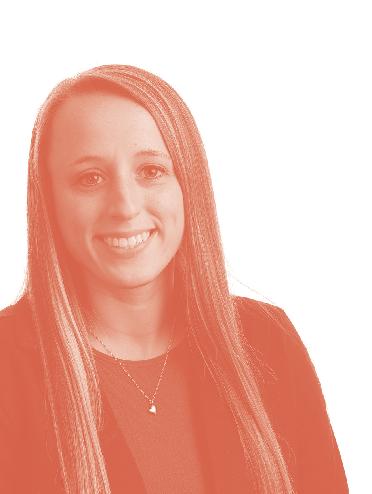
Abby Schlageter writes, “My experiences while studying abroad during the fall semester of my junior year at Boston College have transformed my career aspirations and have fueled my advocacy for climate justice and a career in environmental economics. While studying in Geneva, I had the privilege of participating in a full-time internship with the International Institute for Sustainable Development (IISD). IISD is and NGO which seeks to promote sustainable development and climate action, and that experience gave me a newly focused drive and ambition.”
2018
Lauren MacKinnon lmackin1@villanova.edu

Clair Salvo

2007 ALU m NI SPOTLIGHT
Clair was commissioned to do a piece for the Biden campaign. She said, “I was brought on to do just one piece: the live drawing of Kamala that aired via the Vote Joe twitch. Everything subsequently has been independent of the campaign (though mostly related to politics).
“I've been working in ballpoint pen lately. These are my portraits of RBG and AOC. I've been turning these ballpoint drawings into wearable items as well: pins, sweatshirts, t-shirts and a tote bag (which benefits Stacey Abrams' Fair Fight).”
to
pu RChAsE | www.clairesalvo.com/merch
IN m E m ORIA m

Ms. Myrtle Neff ’12 | Jan. 1, 2020 Ms. Doris Sander Foote ’25 | Jan. 1, 2020 Mrs. Elizabeth Verdier Zellers ’38 | May 6, 2020 Mrs. Elizabeth Long Byers ’39 | Jan. 8, 2019 Mrs. Mary Ann Swanger Burns ’40 | Oct. 17, 2020 Mrs. Sara Rohrer Peterson ’44 | Nov. 17, 2019 Mrs. Charlotte Feagley Fitzpatrick ’45 | April 18, 2020 Mrs. Nelda Diller Strange ’47 | June 25, 2020 Mrs. Mary Anne Rohrer Bailey ’47 | May 23, 2020 Mrs. Margaret Hunt Landis ’49 | Nov. 9, 2020 Mr. Joseph T. Breneman II ’49 | Feb. 20, 2020 Mrs. Helena Slaugh Freeburg ’49 | March 10, 2019 Mr. Robert Droz ’50 | April 3, 2020 Ms. Ellen Franklin Grove ’50 | Jan. 2, 2019 Mr. Hank Silver ’53 | May 12, 2019 Mrs. Suzanne Trout Metzler ’56 | April 12, 2020 Mr. Robert Skinner IV ’59 | Nov. 18, 2019 John L. Atlee III M.D. ’59 | Dec. 18, 2020 Mr. Herbert L. Hogg ’65 | Nov. 15, 2020 Mr. Donald S. Watt ’65 | Jan. 15, 2020 Mrs. Eleanor Herr Rabinowitsh ’67 | Feb. 14, 2020 Mr. Alan M. DeVitry ’72 | Nov. 13, 2019 Ms. Deanna Marschka ’76 | Sept. 20, 2020 Mr. Andrew D. Stauffer ’76 | Dec. 18, 2020 Mr. Adam M. Jester ’06 | July 1, 2019 Mr. George R. Proffitt ’17 | May 9, 2019






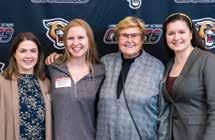



alumni
weekend

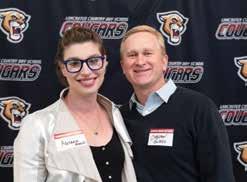
Graduates from years ending in four and nine returned to school to celebrate Alumni Weekend 2019, though plenty of their fellow alums across the decades joined in the fun too. Bonnie Kaplan and Katie Kozloff, both of the Class of ’99, were named to the Athletic Hall of Honor, with each four-year varsity letter winner giving the inducting speech for the other. Other highlights from the weekend included the all-alumni cocktail party, campus tours, and, of course, the John A. Jarvis Competitive Croquet Tournament.

